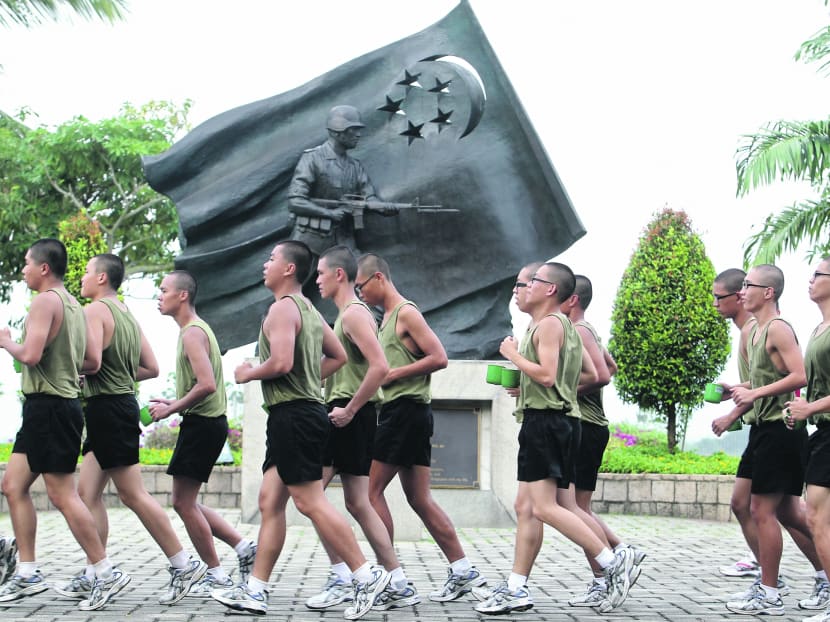SAF reviews requirements to allow more to serve in various vocations
SINGAPORE — To tackle manpower challenges arising from lower birth rates in recent years, the military is reviewing requirements to “increase flexibility” and allow more soldiers to be deployed in various vocations in the Singapore Armed Forces (SAF).
SINGAPORE — To tackle manpower challenges arising from lower birth rates in recent years, the military is reviewing requirements to “increase flexibility” and allow more soldiers to be deployed in various vocations in the Singapore Armed Forces (SAF).
A review by the SAF Medical Corps on these requirements is expected to be completed soon, and changes will be implemented “progressively over the next few years”, said Defence Minister Ng Eng Hen in his opening address at the Asia Pacific Military Health Exchange on Tuesday (May 23).
By 2030, the pool of full-time national servicemen (NSFs) is expected to shrink by one-third — a challenge which the medical corps must “respond decisively” to, he said. “Because of our manpower constraints, each soldier is valuable, whose contributions need to be optimised and put to full use for the nation’s defence,” added Dr Ng.
He also acknowledged military medical practitioners for their contributions in humanitarian aid during disasters, in pandemic and terrorism control, and care and rehabilitation for casualties, among others.
The review, which is expected to be completed by the end of this year, will increase flexibility for deployment. However, it is unclear if the revised requirements will kick in during pre-enlistment, or after full-time national servicemen have completed their basic military training (BMT).
In response to TODAY’s queries, the Ministry of Defence (Mindef) said it will divulge more details at a later date.
Currently, pre-enlistees are assigned a physical employment status (PES), which is one factor in determining their vocation during National Service (NS). For example, those assigned PES A are deemed fit for all field duties, including frontline duty, manoeuvre vocations and direct combat. Those in PES C are fit for combat support vocations and undergo a modified BMT programme, while those in PES E are fit only for administrative duty.
The review was first announced during the debate on Mindef’s budget this year. Second Minister for Defence Ong Ye Kung noted then that as technological advancements in the SAF have altered the nature of military vocations, the requirements are being reviewed to deploy NSFs more effectively in accordance to their fitness and abilities.
Dr Ng also cited the army’s new Centre of Excellence for Soldier Performance — set up to redesign fitness training to enhance the potential of every soldier — as a move to navigate manpower constraints.
“(The centre) allows our medical professionals to work with the training community and sports scientists to increase the potential and enhance performance of every soldier,” he said.
As part of efforts to encourage greater ownership among NSFs and create a more positive NS period, the first batch of pre-enlistees were allowed to express their interest in 33 vocations across the SAF, the
Singapore Police Force and the Singapore Civil Defence Force during their pre-enlistment screening at the Central Manpower Base from November last year.
Excluded from the options are elite forces such as commandos and naval divers, roles that have more stringent selection criteria. While Mindef tries to match NSFs to vocations based on their interests and aptitudes, the ministry has stressed that operational requirements remain a key consideration during postings.
Twenty-three courses conducted by the SAF are also now accredited under the Workforce Skills Qualification scheme, a move aimed at giving NSFs a leg up in their future careers. These include the BMT for most recruits, except for commando or naval diver trainees. The other accredited courses centre on leadership, medical and logistics management.
The Asia Pacific Military Health Exchange, in its third iteration, is held for the first time in Singapore. Jointly organised by the SAF Medical Corps and the United States Pacific Command, the four-day conference brings together 500 military personnel from over 25 nations to discuss the latest in military health and medicine.










